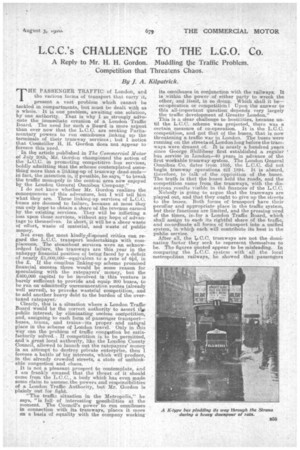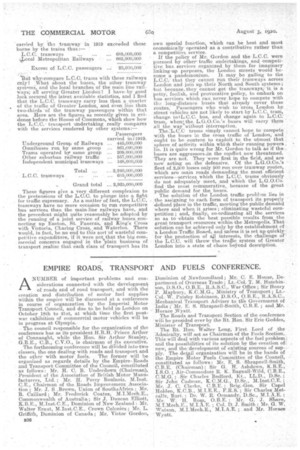L.C.C.'s CHALLENGE TO THE L.G.O. Co.
Page 13

Page 14

If you've noticed an error in this article please click here to report it so we can fix it.
A Reply to Mr. H. H. Gordon. Muddling the Traffic Problem. Competition that Threatens Chaos.
By J. A. Kilpatrick.
THE PASSENGER TRAFFIC of London, and the various forms, of transport that carry it, present a, vast problem which cannot be tackled in compartments, but must be dealt with as a whole. It is one problem, awaiting one solution, by' one authority. That is why I so strongly adVoeate the inunediate creation of a London Traffic Board. The need for such a Board is more urgent than ever now that the L.C.C. are =seeking Parliatuentary powers to run omnibuses linking up the terminals of their tramway services; but I notice that Councillor IL H. Gordon does not appear to foresee this need.
• In the article published in The Commercial Motor of July 20th, Mr. Gordon championed the action of the L.C.C. in promoting competitive bus services, boldly admitting that the scheme contemplated something more than alinking-up of tramway dead-ends--in fact, the intention is, if possible, he says, "to break the traffic monopoly in the central area now enjoyed by the London General Omnibus Company."
I do not know whether Mr. Gordon realizes the consequences of this adventure, but I will tell him what they are. These linking-up services of L.C.C. buses are doomed to failure, because at most they can only hope to obtain a share eefthe revenue earned by the existing services. They will be inflicting a loss upon those services, without any hope of advantage to themselves. In short, it will be a sheer waete of effort, waste of material, and waste of public money.
• Not even the most kindly;disposed critics can regard the L.C.C. transport undertakings with complacence. The steamboat services were an acknowledged failure, the tramways are this year in the unhappy financial position of being faced by a deficit of nearly £1,000,000—equivalent to a rate of 60. in the R. If the omnibus:I-inking-up scheme promised financial success there 'would be some reason for speculating with the ratepayer's' money, but the X400,000 capital to be involved in this venture is barely sufficient to provide and equip 200 buses' to be run on admittedly unremunerative routes (already well served), to provoke wasteful competition, and to add another heavy debt to the burden of the overtaxed ratepayer.
Clearly, this is a situation where a London Traffic Board would be the correct authority to assert tlee public interest, by eliminating useless emeipetition, and, assigning to each form of passenger transport— buses, trains, and trains—its proper and natieral place in the scheme of London travel. Only in this way can the problem of traffic congestion be satisfactorily solved.. If competition is to be permitted, and a great local authority, like the London County Council, allowed to launch out the ratepayers' money in an attempt to destroy private enterprise, then I foresee a battle of big interests, which will produce, in the already crowded streets, a state of unthinkable congestion and chaos. It is not a pleasant prospect to contemplate, and I am frankly amazed that the threat of it should come from the L.C.C., a body which has even made some claim to assume, the powers and responsibilities of a London Traffic Authority, but Mr. Gordon is 'plainly out for fight.
"The traffic situation in the Metropolis." he says, "is fullof interesting possibilities it the moment. The Council's power' to run omnibuses in connection with its tramways, places it more on a basis of equality with the company working its omnibuses in conjunction with the railways. It is within the power of either party to wreck the other, and itself, in so doing. Which shall it be— co-operation or competition? Upon the answer to this all-important question depends very largely the traffic development of Greater London."
This is a clear challenge to hostilities, because until the L.C.C. scheme was projected, there was a certain measure of co-operation. It is the L.C.C. competition, and not that of the buses, that is now threatening a traffic, war in London. The buses were running on the streets ofeLondon long before the tramways were dreamt of. It is nearly a hundred years since George Shillibeer first established a regular bus service in London-40 years in advance of the first workable tram*ay system. The London General Omnibus Co. dates from 1855, the L.C.C. did not begin tramwayoperations till 1894. It is absurd, therefore, to talk of the opposition of the buses. The truth is that the buses held the roads, and the competition came from the tramways, with the disastrous results visible in the financee of the L.C.C.
Nobody is going to argue that the tramways are played out, and that they ought to give up the streets to the buses. Both forms of transport have their peculiar and appropriate place in the traffic system, but their functions are limited, and the pressing need of the times, is. for a London Traffic Board, which shall assign to each its rightful share of the traffie, and co-ordinate all forms of transport into a, unified system, in which each will contribute its best in the public service. After all, the T.C.C. tramways are not the dominating factor they seek to represent themselves to be. The figures quoted appear to be misleading. In comparing the L.C.C. system with 'all the local metropolitan railways, he showed that -passengers • carried by the tramway in 1919 borne by the trains thus exceeded those L.C.C. tramways 685,000,000 scal Metropolitan Railways 662,000,000 Excess of L.C.C. passengers 23,000,000 *.But wh y,corapare L.C.C. trains with these railways only'? What about the buses, the othertramway systems, and the local branches of the main line rail
ways; serving Greater Tendon'? I have by geed luck seeured the latest available statistics, and I find that the L.C.C. tramways carry less than a quarter of the traffic of Greater London, and even re.ss than two-thirds of the tramway passengers within that area. Here are the figures as recently given in evidence before the House of Commons, which show how the L.C.C.transport undertaking really eompares with the services rendered by other systems:—
Passengers carried ini1919.
Underground Group of Railways ... 445,000,000 Omnibuses run by same group ... 861,000,000 Trams operated by same group 209,000,000 Other suburban railway traffic ... 557,000,000 Independent municipal tramways ... 168,000,000
Total ... ... 2,240,000,000
L.C.C.. tramways
... 6854.000,000
Grand total 2,925,000,000
These figures give a very different complexion to the pretensions of the L.C.C. to plunge into a fight for traffic supremacy. As a matter of fact, the L.C.C. tramways have no more occasion to run competitive bus services than the main-line railways have, and the precedent might quite reasonably be adopted by the running of a joint service of railway buses connecting up Euston, St. Pancras, and King's Cross with Victoria, Charing Cross, and Waterloo. There would, in fact, be no end to this sort 'of wasteful competitive expenditure, if it were not that the big commercial concerns engaged in the plain business of transport realize that each class of transport has its
own special function; which can be best and most econornically operated as a contributive rather than a competitive service. If the policy of Mr. Gordon and the L.C.O. were pursued by other traffic undertakings, and competitive bus services organized, by them for imaginary linking-up purposes, the London streets would be
come a pandemonium. It may be galling to the L.C.C. that they cannot run their tramways across London and join up their North and South systems; but because they cannot get the traruways,-.'it is a petty, foolish, and provocative policy, to embark on bus services which can never hope to compete with the long-distance buses that already cover these routes: Passengers who wish to cross London by• street vehicles are not likely to start by L.C.C. tram, change toxL.C.C. bus, and change again to L.C.C.' tram, when' L.G.O.Co.'s -buses will carry them all the way without interruption.
The:L.C.0 trams simply cannot hope to compete with the buses in the cross traffic of 'London, and ought to be .content to exploit to the utmost that sphere of activity within which their running powers lie. It is quite wrong for Mr. Gordon to talk as if the buses are aggressorsdn the conflict now threatened. They are not. They were first in the field, .and are now acting on -the defensive. Of the L.G.O.Co.'s fleet of.2,500 buses only 500 run over tramway routes, which are main roads demanding • the most efficient services—services which the L.C.C. trams obviously do not adequately meet, and which the L.G.o.co. find the most remunerative,. because of the great public demand for the buses. The solution of the London traffic problem lies in the assigning to each form of transport its properly defined place in the traffic, meeting' the public demand where and when it arises ; eliminating wasteful competition ; and, finally, co-ordinating all the services so as to .obtain the best possible results from the great transport resources within the Metropolis. That solution can be achieved only by the establishment ef • a London Traffic Board, and unless it is set up quickly for the protection of all interests, the challenge of the L.C.C. will throw the traffic system of Greater London into a state of chaos 1;ekond description.






























